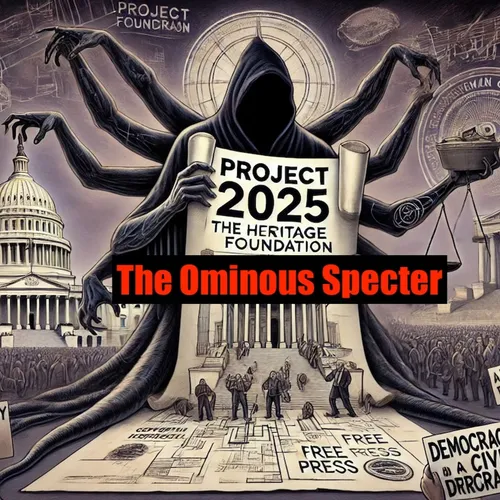"Sweeping Reforms or Threat to Democracy? Project 2025's Radical Vision for American Governance"
- Author
- Quiet.Please
- Published
- Thu 20 Mar 2025
- Episode Link
- https://www.spreaker.com/episode/sweeping-reforms-or-threat-to-democracy-project-2025-s-radical-vision-for-american-governance--65001404
As I delve into the intricacies of Project 2025, a blueprint crafted by the Heritage Foundation and backed by over 100 conservative organizations, it becomes clear that this initiative is not just a policy agenda, but a comprehensive plan to reshape the very fabric of American governance.
At its core, Project 2025 aims to dismantle what its proponents call the "administrative state," a term that encompasses the operations of federal agencies and programs. This vision is laid out in a 900-page document that outlines a radical transformation of the federal government, one that would concentrate executive power and align it with conservative principles.
One of the most striking aspects of Project 2025 is its proposal to eliminate or significantly alter several key federal agencies. The Department of Homeland Security (DHS), for instance, would be dismantled, and the Transportation Security Administration (TSA) would be privatized. This move is particularly alarming given the critical role these agencies play in national security, especially since their creation in response to the 9/11 terrorist attacks. As AFGE President Everett Kelley noted, "Bringing our country back to the pre-9/11 era is not only irresponsible but also puts all of us at risk."
The Department of Education is another target, with plans to eliminate it and transfer oversight of education and federal funding to the states. This shift would not only reduce federal involvement in education but also curtail regulations against sex-based discrimination, gender identity, and sexual orientation in schools. The project's backers argue that education should be a private rather than a public good, a stance that could have profound implications for public schools and the millions of students they serve.
The Federal Emergency Management Agency (FEMA) is also on the chopping block, with proposals to shift disaster preparedness and response costs to states and local governments. This change is justified by the argument that FEMA is "overtasked" and "overcompensates for the lack of state and local preparedness and response." However, critics argue that such a shift would leave vulnerable communities without the necessary federal support during times of crisis.
The Environmental Protection Agency (EPA) would also face significant cuts, with the elimination of regional labs, enforcement and compliance offices, and scientific integrity divisions. This would essentially give corporations a free hand to pollute, endangering public health and the environment. As the AFGE Public Policy Director Jacque Simon pointed out, these changes would "endanger public health by giving corporations and big businesses a greenlight to pollute the air we breathe, the water we drink, and the food we eat."
Project 2025's impact on federal employees is equally daunting. The plan seeks to end collective bargaining for public-sector workers and reinstate Trump’s executive orders that bust unions and direct agencies to renegotiate contracts to obtain stronger management rights. The reintroduction of Schedule F, which would reclassify career federal employees connected to federal policy, could politicize the civil service, allowing the administration to hire and fire based on political loyalty rather than merit. This could affect over 500,000 employees, stripping them of their work protections.
The project's broader policy objectives are just as sweeping. It advocates for reducing taxes on corporations and capital gains, instituting a flat income tax, and cutting Medicare and Medicaid. It also proposes reversing many of President Joe Biden's policies, including those related to environmental regulations, which would favor fossil fuels over renewable energy. Research funded by taxpayer dollars would need to align with conservative principles, with climatology research receiving significantly less funding.
In the...
